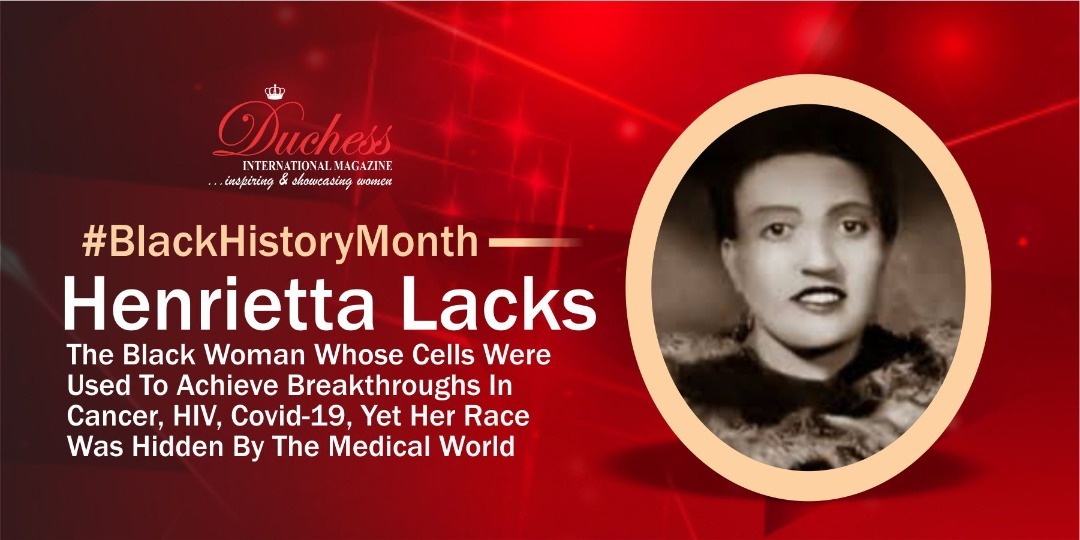Medical science would not be complete without the mention of an African-American woman, Henrietta Lacks, who unknowingly donated her cells at Hopkins in 1951, the cancer cells birthed the HeLa cell line, the first immortalized human cell line. For many years, the prolific and durable line of cells has been used in medical research around the world.
Henrietta Lacks just like countless other black women has made significant contributions to different fields, yet they remain unnamed, without due recognition.
A young married mother of five, Henrietta Lacks lived near Baltimore but fell ill, so after experiencing extensive vaginal bleeding, she went to Johns Hopkins medical center, one of the few leading hospitals offering care to blacks at the time, there she was diagnosed with cervical cancer. While undergoing treatment, without her knowledge and consent, doctors took samples of her cancerous cells and offered them to researchers, in the laboratory these cells were found to have extraordinary strength of durability and ability to reproduce and were dubbed ‘immortal’, it became known as the HeLa cells -the first immortal line of human cells.

The cells were mass-produced, with lots of profit made without recognition or money being passed to her family. Over 50,000,000 metric tonnes of HeLa cells have been distributed around the world – forming part of over 75,000 studies, basis of modern medicine today leading to papillomavirus and polio vaccines, discoveries in many fields, including cancer, allowing for the development of drugs for HIV/AIDS, hemophilia, leukemia, and Parkinson’s disease; breakthroughs Vitro fertilization; research on chromosomal conditions, cancer, gene mapping, and precision medicine and now, studies for Covid-19.
Although Henrietta Lacks died on October 4, 1951, at just 31 years old, it wasn’t until 1975 the family discovered that Henrietta’s cells were in circulation. John Hopkins has made efforts to right the historical wrong, and bringing the injustice to light, in 2010, Rebecca Skloot published The Immortal Life of Henrietta Lacks, based on Henrietta Lacks’ life. The 2017 movie of the same name featured two-time Oscar nominee Oprah Winfrey as Deborah Lacks in The Immortal Life of Henrietta Lacks, for HBO.
In recognition of Lacks’s remarkable contribution to the world of science, on Wednesday, October 13, the World Health Organisation’s Director-General, Tedros Ghebreyesus, cemented her legacy with a special recognition award.
According to Tedros, “In honouring Henrietta Lacks, WHO acknowledges the importance of reckoning with past scientific injustices, and advancing racial equity in health and science,” said Dr. Tedros. “It’s also an opportunity to recognize women – particularly women of color – who have made incredible but often unseen contributions to medical science.”
The award was received at the WHO office in Geneva by Lawrence Lacks, Ms. Lacks’ 87-year-old son, he was accompanied by several of Henrietta Lacks’ grandchildren, great-grandchildren, and other family members.
“We are moved to receive this historic recognition of my mother, Henrietta Lacks – honoring who she was as a remarkable woman and the lasting impact of her HeLa cells. My mother’s contributions, once hidden, are now being rightfully honored for their global impact,” said Lawrence Lacks, Sr., Henrietta Lacks’ eldest son. “My mother was a pioneer in life, giving back to her community, helping others live a better life, and caring for others. In death, she continues to help the world. Her legacy lives on in us and we thank you for saying her name – Henrietta Lacks.”
Assistant Director-General for Strategic Priorities and Special Advisor to the Director-General, Princess Nothemba Simelela,
Reminding that the HPV vaccine was developed using Henrietta Lacks’ cells, she added: “We owe it to her and her family to achieve equitable access to this groundbreaking vaccine.”
“It is unacceptable that access to the lifesaving HPV vaccine can be shaped by your race, ethnicity, or where you happen to be born,” said Dr. Princess Nothemba (Nono) Simelela, Assistant Director-General for Strategic Priorities and Special Advisor to the Director-General. “The HPV vaccine was developed using Henrietta Lacks’ cells. Although the cells were taken without her consent and without her knowledge, she has left behind a legacy that could potentially save millions of lives. We owe it to her and her family to achieve equitable access to this groundbreaking vaccine.”
Respect to Henrietta Lacks who in death continues to save countless lives.



